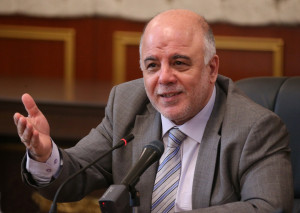
Joint oil production, energy, water conservancy, transportation and other facilities formed the core of the national economy. They showed their vitality, especially during the wars, blockades, and occupations that befell the Iraqi people.
Moscow is close to Baghdad, not only geographically, but also in the understanding of its priorities at the current turbulent stage of development, Iraqi writer and researcher Hussein Ali Hamdi said. This makes it an ally of Iraq both in times of peace and war in regard to its responses to various challenges: from the problems of terrorism to oil and other sectors of the economy.
Iraqi analysts were focused on the military and technical dossier of the latest high-level talks in Moscow. Several Members of the Iraqi Parliament emphasized the importance of the visit of Prime Minister Haider al-Abadi in line with the diversification of relations of Iraq waging the war with ISIS in the field of defence.
More local politicians, who consider it appropriate to diversify the sources of their arms, appealed to this recently so as not to be dependent on only one pole – the USA.
“Our country, which has become a target of the Islamic State, is free to choose a partner on the international scene,” the Iraqi newspaper Al-Alam said. We will focus on the East or on other countries, the relations with which are of interests for the country and people.”
The eminent Iraqi expert on counter-terroris
The call of the Iraqi Prime Minister made during his visit to Moscow for Russian companies to actively invest and operate in the Iraqi market has not gone unnoticed either.
In March 2014, the Russian company Lukoil started the commercial production of oil at the site West Qurna-2 near Basra city not far from the Persian Gulf. In the barren desert, in just two years a real industrial oasis was established.
The wealth of West Qurna-2 is comparable with proven oil reserves in a number of leading oil producing countries of the world. The project is planned to last for 20 years and, according to available information, the field operator Lukoil expects to earn tens of billions of dollars.
Iraqi media paid attention to the booming trade between the two countries: over the last two years it has increased by a factor of 10 and reached 2 billion USD excluding military supplies. This, according to analysts, means a return to the volume of trade that existed in 1989 before the collapse of the Soviet Union and the imposition of sanctions against Iraq.
Strengthening relations with Russia is high-demanded, the Mesopotamian Centre for Strategic Studies in Iraq noted. According to it, the decision of Baghdad to more actively encourage Russian business to invest in areas such as hydrocarbons, electrical power generation, and construction of large facilities, reflects the recognition of the place and role of the new Russia in the Middle East. This will give the green light to bringing trade and economic relations between Moscow and Baghdad to a new level, as well as open better geostrategic prospects in the region for Iraq, and give greater dynamism and much evolution to its foreign policy.
Yuri Zinin, Senior Research Fellow at the Moscow State Institute of International Relations (MGIMO), exclusively for the online magazine “New Eastern Outlook”.
